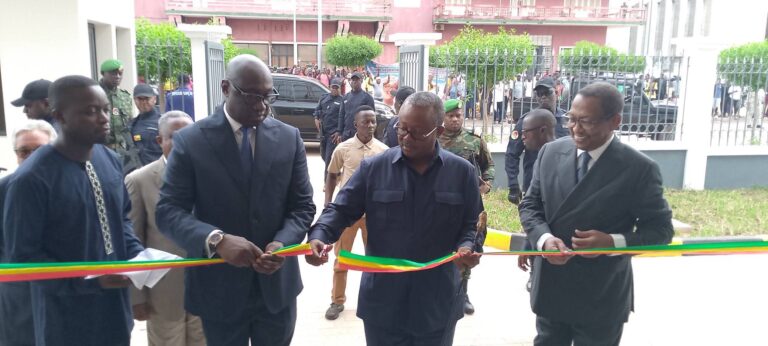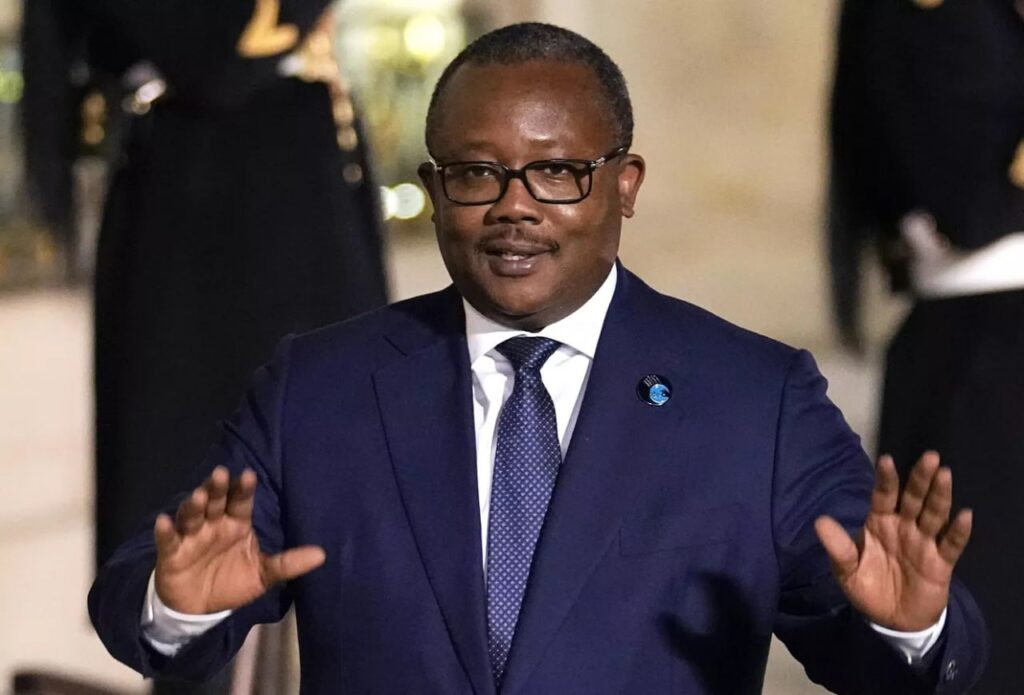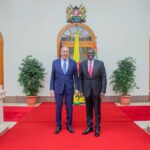Guinea-Bissau heads to simultaneous presidential and legislative elections on 23 November 2025 (with a possible second presidential round on 30 November) under highly contentious conditions: the opposition’s main force (PAIGC/Pai Terra Ranka) has been barred by court rulings, and President Umaro Sissoco Embaló has consolidated control after dissolving parliament in Dec 2023, expelling/pressuring ECOWAS mediators in early 2025, and reshuffling the premiership months before the vote. The risk picture features institutional capture, security force politicking, and the country’s persistent narco-economy. External stakes are rising: Russia is courting Bissau with mining/port deals, while ECOWAS and the EU fret about democratic backsliding and post-election stability.
Key actors
- Umaro Sissoco Embaló (incumbent president) – Seeks a second term amid a mandate dispute; dissolved the opposition-led parliament in 2023; escalated against ECOWAS earlier in 2025; announced November elections after travel to Moscow/Baku/Budapest
- Braima Camará (Prime Minister, MADEM-G15) – Appointed August 2025 to organize elections; a longtime power broker whose selection signals presidential control over the electoral machinery
- PAIGC / “Pai Terra Ranka” (Domingos Simões Pereira) – Historic independence party and principal opposition bloc disqualified by the Supreme Court over filing/registration issues; Pereira himself excluded from the provisional presidential list
- Other parties – PRS, APU-PDGB and smaller lists will contest but lack PAIGC’s national machine, helping the presidency in a fragmented field. (Context drawn from election listings and prior seat shares
- Security elites – Factionalized military and security services retain outsized veto power given repeated coup/putsch episodes and are pivotal in a disputed-result scenario
- ECOWAS/UNOWAS – Tried to mediate mandate/election timing; mission withdrew after threats of expulsion; leverage diminished going into the vote.
Structural trends shaping the vote
- Judicialized exclusion and institutional asymmetry – Court decisions sidelining PAIGC/Pai Terra Ranka and Pereira set the stage for low-competition elections and post-vote legitimacy disputes
- Executive dominance after parliamentary dissolution – Repeated dissolutions (2022, 2023) normalized emergency politics and weakened legislative oversight
- Mediator fatigue & regional isolation – ECOWAS withdrawal signals shrinking guardrails; Bissau’s latitude to manage results domestically has grown
- Criminal-economy resilience – The “narco-corridor” remains a background risk amplifier (money, coercion, and rogue networks), complicating any clean security environment around polling
- Great-power courtship – Russia advances extractives/port interests; China/others keep a watching brief; Portugal/EU scrutinize rights and media pressure.
Risk map (election period)
- Operational risks: voter roll disputes; late court decisions; local intimidation; logistics and security constraints outside Bissau
- Political risks: boycott calls; mass protests around certification; selective enforcement against opposition figures; information operations
- Security risks: arrest waves, “coup-plot” narratives, and selective deployments that chill turnout; potential clashes near key tally centers
- External risks: ECOWAS censure limited by earlier standoffs; bilateral pressure from Portugal/EU; opportunistic Russian economic-security signaling
Scenarios (0–3 months)
1) Managed continuity (most likely; medium impact)
Incumbent advantage plus opposition fragmentation delivers Embaló re-election and a legislature friendly to the presidency. International partners issue concerned but cautious statements; ECOWAS avoids direct confrontation. Expect incremental cabinet reshuffles and a push to normalize the legal path that barred PAIGC, with limited urban protests. Risks: legitimacy deficit; later instability if economic/donor conditions worsen
2) Disputed outcome with coercive stabilization (plausible; high impact)
Tight or regionally uneven results prompt opposition mobilization. Government highlights “security threats” and arrests select figures; security forces disperse crowds; certification proceeds under pressure. ECOWAS hedges; Brussels and Lisbon warn on aid conditionality. Risks: episodic violence; donor freezes; reputational hit.
3) Shock opposition performance via allied lists (lower probability; very high impact)
Despite PAIGC’s exclusion, anti-incumbent votes coalesce behind secondary tickets/independents, producing an awkward cohabitation or legislative check. Expect intense litigation, bargaining, and possible elite splits in the security services. Risks: paralysis; snap votes; temptation for extra-legal fixes
4) Extra-constitutional rupture (tail risk; extreme impact)
A failed putsch or a major mutiny around certification triggers state of exception and prolonged ECOWAS crisis diplomacy. Foreign commercial partners (ports/mining) pause or renegotiate exposure; humanitarian indicators worsen
Foreign influence & external stakes
- Russia – February 2025 resource/port understandings. (bauxite/phosphate/hydrocarbons; Buba deep-water port concept; Rusal interest). Even absent formal security footprints, Moscow gains leverage over elite financing and post-election concessions (licenses, logistics corridors). If continuity prevails, expect deal operationalization and political cover for it
- ECOWAS/UNOWAS – Capacity to compel corrective steps is diminished after the March withdrawal; any censure will likely be rhetorical unless instability spills regionally
- EU/Portugal – Focused on media expulsions, rule-of-law concerns, and election integrity; can condition budgetary support and visas but reluctant to isolate Bissau fully.
- China/other investors – Watching mining/logistics; risk-reward calculus improves with political continuity. Quiet diplomacy likely on infrastructure and fisheries. (Context from broader Guinea/region investment patterns.
- Transnational crime networks – Seek permissive governance regardless of winner; instability windows are exploited for cocaine transshipment and money flows.
What to watch (indicators)
- Final candidate list changes or late rehabilitations via courts/CEC
- Security force rotations around Bissau and ports in the week before polls
- ECOWAS language post-vote: “concern” vs. “non-recognition” signals
- Russian commercial steps (MoUs crystallizing into contracts; delegations tied to Rusal/ports
- Media/NGO constraints (expulsions, credentialing limits
Consequences (6–12 months outlook)
- If continuity (Scen. 1):
- Governance: Consolidation of a presidentialized system; constrained checks and balances.
- Economy: Resource deals progress; port/mining logistics advance; donor relations uneasy but functional.
- Security/Crime: Narco-corridor persists; episodic crackdowns calibrated to external pressure
- If disputed (Scen. 2):
- Governance: Legal warfare; ad-hoc states of exception.
- External: ECOWAS/EU conditionality; risk of sanctions on individuals; financing delays.
- Market: Investors price in delay risk for port/mining; cash-flow stress in ministries
- If opposition breakthrough (Scen. 3):
- Governance: Hard bargaining to reopen political space; possible partial PAIGC reintegration via by-elections or pacts.
- External: Warmer EU ties; stricter oversight on resource deals; higher friction with Moscow if contracts are reviewed.
- If rupture (Scen. 4):
- Governance: Prolonged stalemate; potential ECOWAS sanctions/deployment debate.
- External: Aid suspension; capital flight; elevated migration and illicit flows in the sub-region
analytic judgment
The baseline is a managed-continuity outcome favoring Embaló, enabled by judicial exclusions and institutional control. The principal danger is not election-day violence per se but post-certification legitimacy deficits that entrench executive dominance and invite external deal-making—notably with Russia in extractives/ports—while ECOWAS leverage remains weak. Any surprise opposition surge would produce high-stakes litigation and elite maneuvering, with outcomes hinging on the stance of the security services and the calculus of foreign partners whose investments can be weaponized as political leverage.
Traffic-Light Risk Matrix (Guinea-Bissau Elections — Nov 2025)Red = High risk | Yellow = Medium | Green = Low
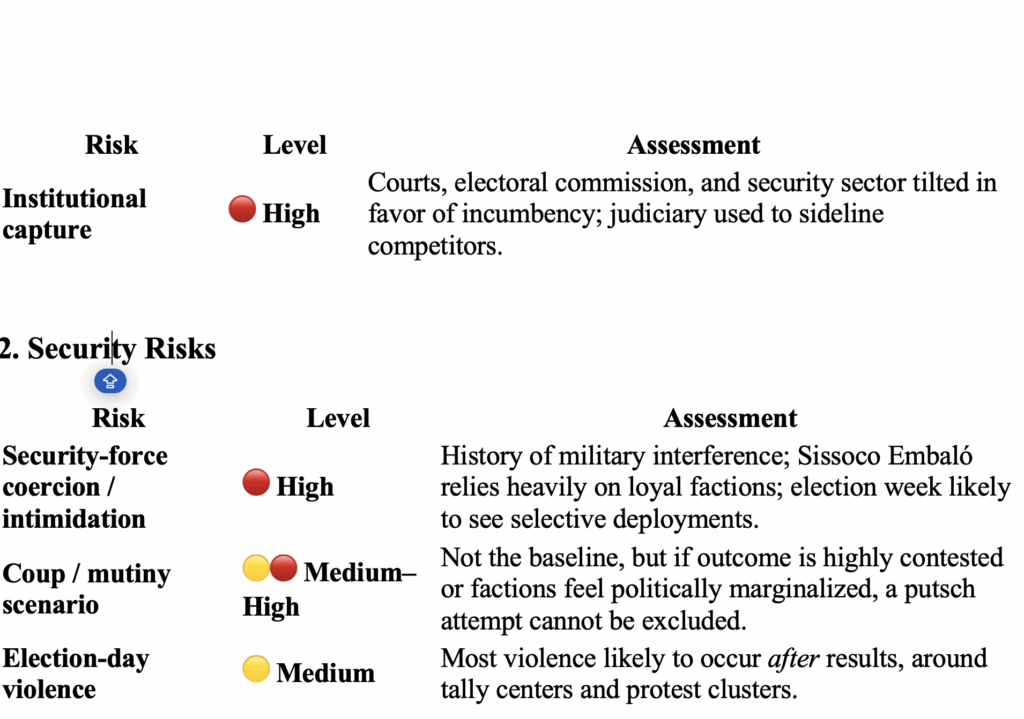
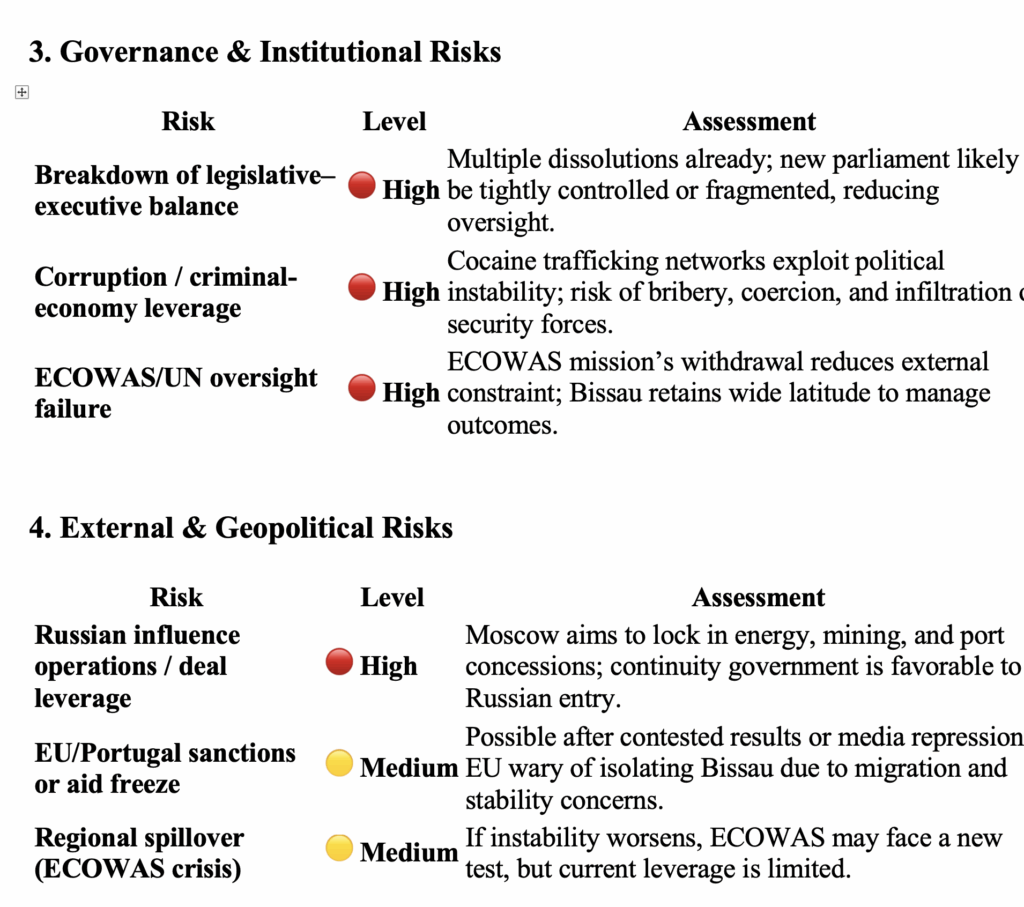
Stakeholder Map (Guinea-Bissau: Elections 2025)
1. Internal Actors
A) Presidency (Umaro Sissoco Embaló)
- Interests: Consolidate second term; maintain dominance through judiciary and security forces; control resource and port deals.
- Capabilities: Loyal security factions, judicial influence, diplomatic ties with Russia and Azerbaijan.
- Risks: Legitimacy deficits; potential post-election protests; EU and ECOWAS pushback.
B) Government & MADEM-G15 (Braima Camará, PM)
- Interests: Organize elections under presidency’s control; secure parliamentary majority.
- Capabilities: Access to state resources; influence over electoral administration.
- Risks: Accountability for unfair processes; reputational costs abroad.
C) Opposition (PAIGC/Pai Terra Ranka; Domingos Simões Pereira)
- Interests: Re-entry into political arena; capitalize on popular dissatisfaction; challenge exclusion.
- Capabilities: Historical legitimacy; strong grassroots support; diaspora backing.
- Risks: Legal exclusion, arrest waves, limited media access.
D) Military & Security Services
- Interests: Maintain influence; secure financial channels; avoid rapid political change.
- Capabilities: History of coups; decisive in crisis moments.
- Risks: Factional splits; external scrutiny; criminal-network penetration.
E) Criminal Networks (Narco-corridor actors)
- Interests: Preserve permissive environment for cocaine transit; maintain ties with political brokers.
- Capabilities: Money, weapons, corrupt enablers inside security forces.
- Risks: Crackdowns if EU or U.S. exert pressure on new government.
2. External Actors
A) Russia
- Interests: Gain strategic foothold via mining, hydrocarbons, and Buba port; expand influence in West Africa after setbacks in Mali/Niger spheres.
- Capabilities: Investment promises, political cover, covert influence.
- Risks: Contract revision if opposition gains ground; backlash from EU.
B) ECOWAS
- Interests: Regional stability; prevent coups; uphold minimum democratic standards.
- Capabilities: Diplomatic pressure; sanctions; mediation.
- Risks: Low leverage after March 2025 withdrawal; internal ECOWAS divisions.
C) EU and Portugal
- Interests: Stability, governance reforms, migration control, anti-crime cooperation.
- Capabilities: Aid, sanctions, visas, diplomatic pressure.
- Risks: Over-pressure may push Bissau toward Russia or China.
D) China
- Interests: Infrastructure, fisheries, long-term resource access.
- Capabilities: Large financing and construction capacity.
- Risks: Political volatility; contract termination in contested outcome.
E) United States
- Interests: Counter narcotics; monitor Russian/Chinese influence; maintain ECOWAS stability.
- Capabilities: Security assistance; diplomatic weight.
- Risks: Limited priority; reactive rather than proactive engagement.
Summary Judgment
Guinea-Bissau’s 2025 elections occur in a high-risk political environment marked by institutional asymmetry, security-force politicking, and foreign actors competing for strategic access.
The traffic-light indicators show multiple red sectors — especially around legitimacy, coercive stabilization, and external influence.
External stakeholders will treat the elections less as a democratic exercise and more as a negotiation over who controls access to ports, minerals, and security relationships in one of West Africa’s most geopolitically exposed microstates.
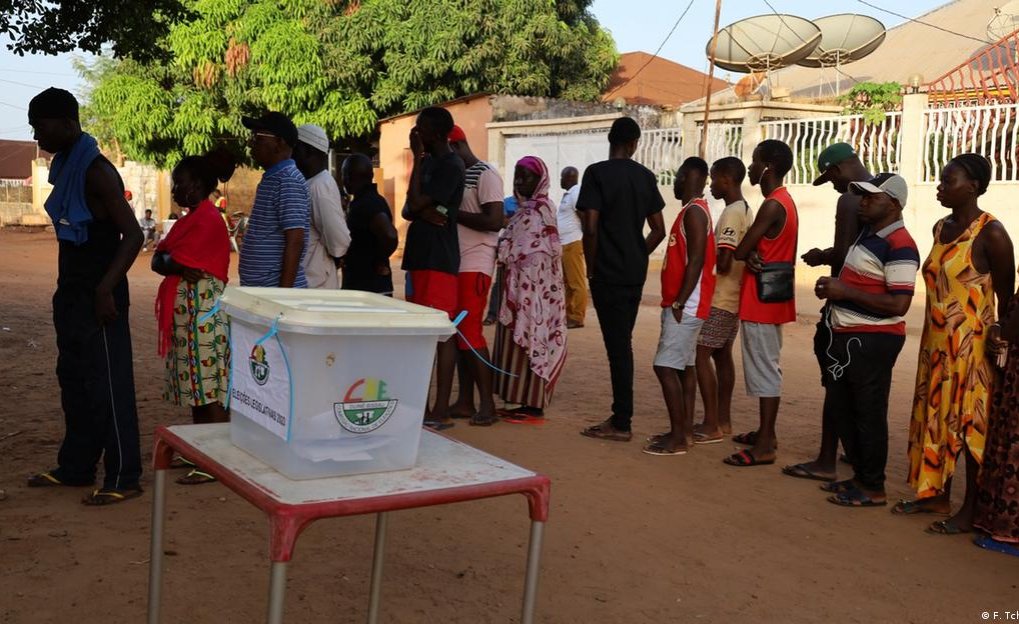
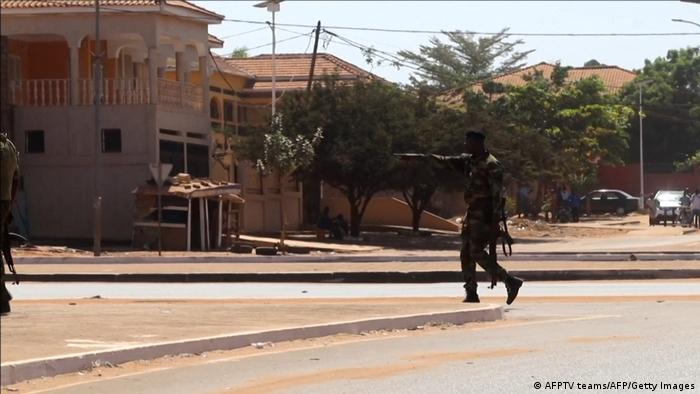
More on this story: Guinea-Bissau’s foiled coup: linked to drug or against French-friendly President


